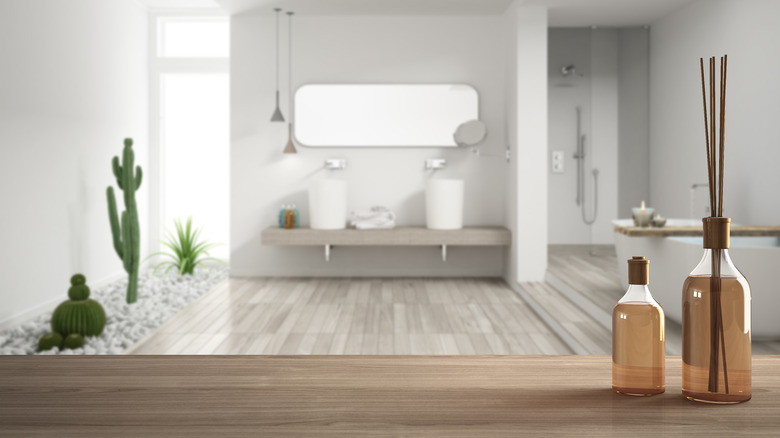The Best Flooring For Uneven Surfaces
In a perfect world, all of the floors in your home would be smooth and even. In this one, however, floors are often slanted, pitted or bumpy. Tearing out and replacing the subfloor is costly and laborious, so most homeowners prefer to skip it whenever possible. If your floor is less than perfect, your best flooring options are carpet, vinyl or linoleum. You might be able to get away with tiles, but you'll have to use a floor leveling product or lots of mastic. The tiles themselves will have to be fairly small as well, making a tiling job more time-consuming. If your floor has only minor issues, hardwood may be an option for you after a bit of prep work.
Carpet
Carpet
Carpet is the perfect material for uneven flooring. You can roll, bend, fold and buckle carpet any way you like and can do so easily. Carpet will conform to the shape of your floor, and plush carpets will even hide the deformities in your floor to create a more even look. To get the best results, use a carpet pad and glue it to the floor in areas around dips and valleys. This will prevent bunching and creasing as the carpet ages. To even out exceptionally deep low spots and slopes, cut extra pieces of the padding to size and stack them up in the low spot. Make sure that the edges of your carpet are firmly tacked down.
Vinyl and Linoleum
Vinyl and Linoleum
Vinyl flooring is a good choice in wet areas where carpet creates issues, such as kitchens and bathrooms. Available in sheets and tiles, vinyl flooring is easy to install and works well on uneven surfaces. Although not as flexible as carpet, vinyl still conforms easily to the shape of the floor underneath it. Vinyl gets glued to the floor and then smoothed over the surfaces where it will easily cover and mold to small peaks and valleys. Vinyl is also one of the easiest floors to install yourself.
Linoleum is very similar to vinyl but is a bit more difficult to cut. It's also not inherently waterproof like vinyl. Linoleum sheets and tiles both work well on uneven surfaces, but you'll likely find linoleum a bit trickier to work with, and it will need sealing when finished to resist water. Although both linoleum and vinyl will work on an uneven floor, they won't hide the unevenness like carpet will.
Small Tiles
Small Tiles
It's generally best to avoid ceramic and other tiles on uneven floors because they are very rigid. Tiles can't mold themselves into the shape of the floor beneath and are much more likely to break when stepped on. If your floor is uneven but your heart is set on tile, there are two ways to pull it off. The first is to choose small tile. Large tiles, such as 12 inch by 12 inch slabs, simply won't work. Smaller mosaic tiles, however, are much more forgiving of an uneven surface.
The second trick is to liberally butter the tiles during installation. When installing tiles, you spread a special adhesive called thinset on the floor and then place the tiles on top of it. Buttering the tiles is the process of spreading a thick layer of thinset on the back of each tile before setting it into the thinset on the floor. Thinset is like putty and is very flexible until it dries. As such, buttering the tile creates a thick layer of flexible adhesive that will ooze into the dips and craters of your floor, filling them in to create a more even surface.
Hardwood Floors
Hardwood Floors
Like tiles, hardwood and laminate floors are generally a bad idea on uneven floors. If your floor is only mildly uneven, however, you may get away with installing them. Before you do, you'll need to level the floor. Floor leveling materials are available at your local hardware store and can save you a lot of work.
You simply pour the leveling compound on the floor and then smooth it out. The material will level itself, automatically filling in any low spot and oozing around high spots rather than making them higher. Once the compound dries, you can install hardwood or laminate on your newly evened floor. This trick doesn't work with severely damaged floors, however, as most leveling compounds are not made to exceed more than 1/2 inch in thickness.
References
- Real Stone and Tile: How to Tile an Uneven Surface
- Floor Coverings International: The Best Flooring Types For Irregular Surfaces
- Angie's List: Linoleum versus Vinyl Floors: What You Need to Know
- Fine Homebuilding: What's the Difference: Linoleum vs. Vinyl
- Today's Homeowner: How Thick to Apply Floor Leveling Compound to a Subfloor
